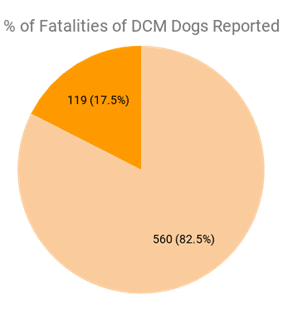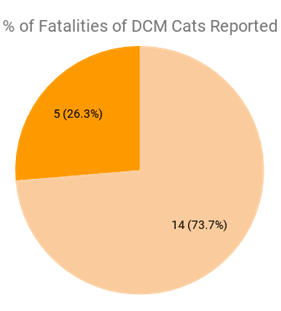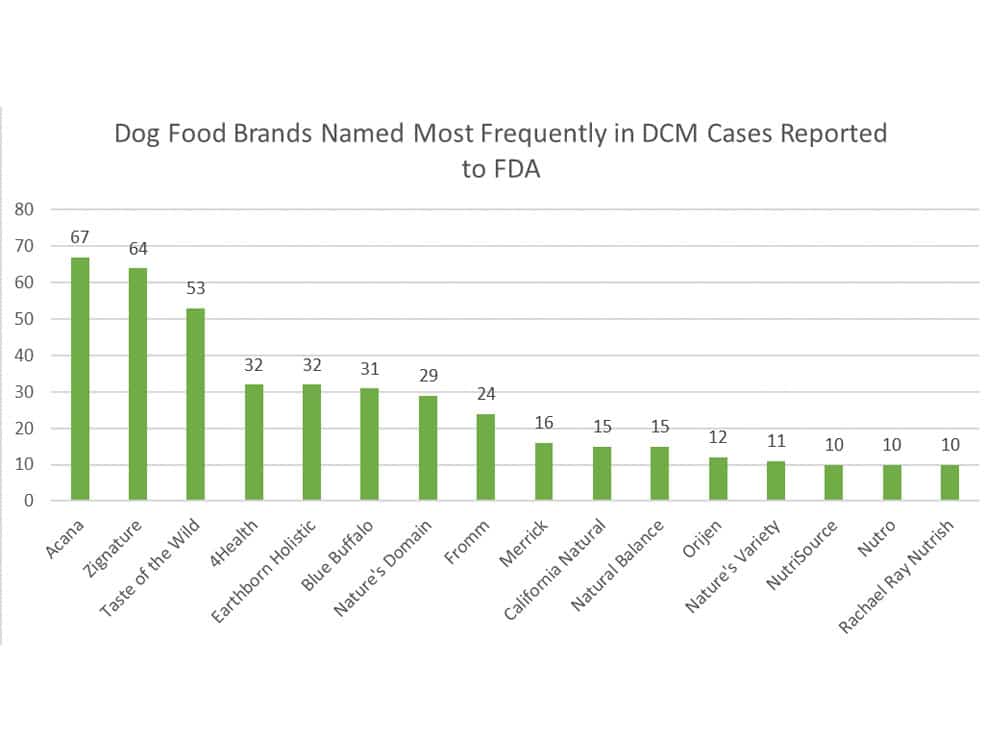
DCM Cases & Dog Food Brands
You may have seen this chart floating around on social media about specific brands of grain-free and boutique diets. Yes, it is concerning, but there’s a lot more to diets and canine DCM (dilated cardiomyopathy) Acne Retin-A than just this single chart.

What is Canine Dilated Cardiomyopathy?
Dilated cardiomyopathy (DCM) is a disease of cardiac muscle that leads to an enlarged heart. As a result, the heart’s ability to pump blood throughout the body becomes more difficult and can lead to fluid buildup in the chest and abdomen.
DCM is generally recognized as a genetic condition that tends to affect male large and giant breed dogs beginning in middle to older age. Breeds associated with this disease are Doberman Pinschers, Great Danes, Irish Wolfhounds, Boxers, Newfoundlands, and Saint Bernards. It is believed to be less common in small and medium breed dogs.
Possible Signs of DCM (or other heart conditions) :
If your pet experiences these symptoms you should contact your veterinarian as soon as possible. If the symptoms are severe and your veterinarian is not available, you may need to seek emergency veterinary care.
- decreased energy
- weakness
- weight loss
- cough
- difficulty breathing
- episodes of collapse
About the Report:
In July 2018, the FDA announced that it had begun investigating reports of canine dilated cardiomyopathy (DCM) in dogs eating certain pet foods, many labeled as “grain-free”.
These diets contained a high proportion of peas, lentils, other legume seeds (pulses), and/or potatoes in various forms (whole, flour, protein, etc.) as main ingredients (listed within the first 10 ingredients in the ingredient list, before vitamins and minerals).
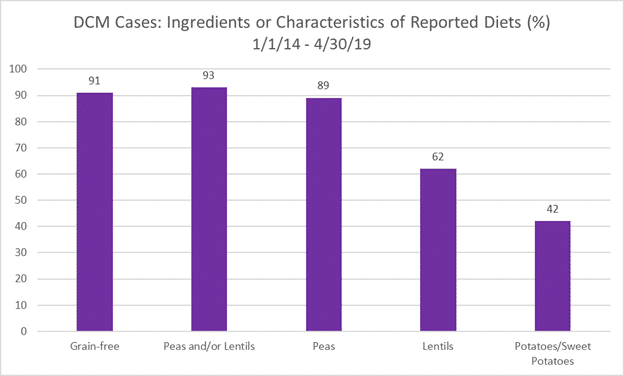
Between January 1, 2014 and April 30, 2018, the FDA received 524 case reports of diagnosed dilated cardiomyopathy. Some of these cases involved more than one animal from the same household. In the reported cases, there were 560 individual dogs diagnosed with DCM and 119 of those dogs died. There were 14 individual cats, 5 of which died. The agency received additional reports of cardiac symptoms in dogs, however, the reports did not include a confirmed DCM diagnosis.
Many of the reports submitted to the FDA included extensive clinical information, including echocardiogram results, cardiology/veterinary records, and detailed diet histories. The numbers above only include reports in which the dog or cat was diagnosed with DCM by a veterinarian and/or veterinary cardiologist. They did not include in these numbers the many general cardiac reports submitted to the FDA that did not have a DCM diagnosis.
The FDA suspects that cases are underreported because animals are typically treated symptomatically, and diagnostic testing and treatment can be complex and costly to owners.
Another puzzling aspect of the recent spike in DCM cases is that they have occurred just in the last few years. The American Veterinary Medical Association estimates that there are 77 million pet dogs in the United States, most of whom have been eating pet food without apparently developing DCM. It’s not known how commonly dogs develop DCM, but the increase in reports to FDA signal a potential increase in cases of DCM in dogs not genetically predisposed.
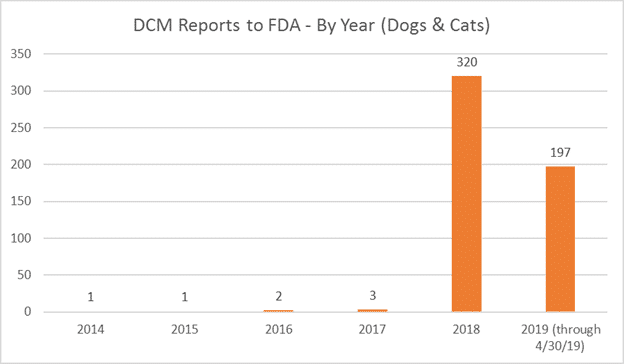
At this time, it is not clear what it is about these diets that may be connected to DCM in dogs. There are multiple possible causes of DCM. Taurine deficiency is well-documented as a potential cause of DCM, but it is not the only cause of DCM. Nutritional makeup of the main ingredients or how dogs process them, main ingredient sourcing, processing, amount used, or other factors could be involved.
DCM itself is not considered rare in dogs, but these reports are unusual because many of the reported cases involved a wide range of age, weight, and breed (many not typically genetically prone to the disease).
Some popular breeds with more than one report include:
| Australian Cattle Dog | Maltese |
| Beagle | Old English Sheepdog |
| Border Collie | Pomeranian |
| Boston Terrier | Pug |
| Chihuahua | Retriever (unspecified) |
| English Cocker Spaniel | Rottweiler |
| French Bulldog | Rough-haired Collie |
| Hound (unspecified) | Schnauzer (unspecified) |
| Irish Setter | Shepherd (unspecified) |
| Irish Soft-Coated Wheaten Terrier | Staffordshire Bull Terrier |
| Jack Russel Terrier | Yorkshire Terrier |
Based on the data collected and analyzed thus far, the FDA believes that the potential association between diet and DCM in dogs is a complex scientific issue that may involve multiple factors. The FDA is still gathering information to better understand if (and how) taurine metabolism (both absorption and excretion) may have a role in these reports of canine dilated cardiomyopathy.
What About My Cat?
The FDA hasn’t sent out anything official regarding cats and only 14 cases are included in their report. Based on what we know about HCM (Hypertrophic Cardiomyopathy, feline heart disease) and taurine deficiencies, a diet with possible taurine blocking ingredients (lentils, peas, legumes) could be potentially dangerous for felines as well as canines. Our veterinarians recommend being cautious about feline grain-free and boutique diets until more research is completed.
What happens now?
The FDA’s Center for Veterinary Medicine (CVM) and the Veterinary Laboratory Investigation and Response Network (Vet-LIRN), a collaboration of government and veterinary diagnostic laboratories, continues to investigate this potential association. The FDA is working with the pet food industry to better understand whether changes in ingredients, ingredient sourcing, processing, or formulation may have contributed to the development of DCM.
If your pup is currently consuming a grain-free or boutique diet, it is best to consider switching to another commercially available diet until we know more.
Several diets on the market are formulated specifically by veterinary nutritionists and are guaranteed to contain the appropriate nutrients for pets. (Learn more: Healthy Pet Diets – It’s What’s for Dinner!)

